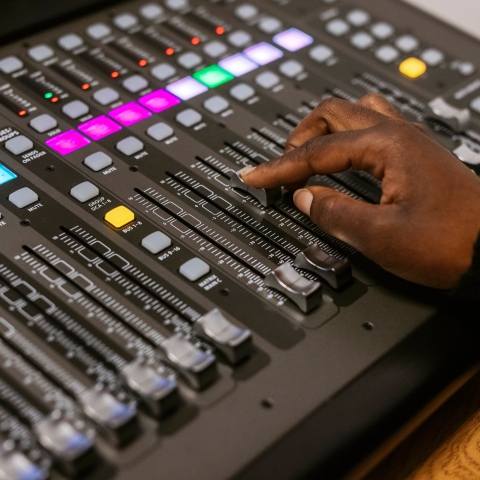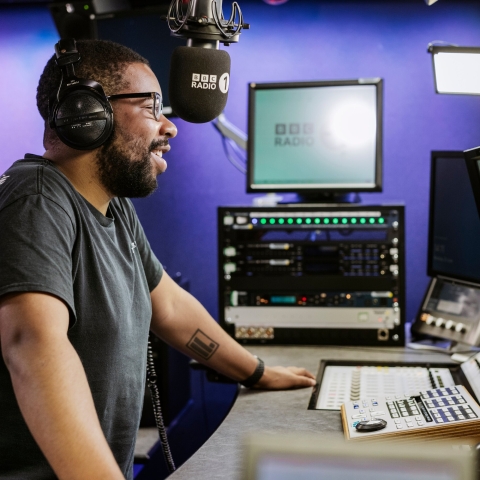
Working within television and radio can be extremely varied so it’s important to think about what area you wish to work in. Do you want to be in front of the camera or behind? Are you more interested in the technical side of the operation? Would you like to write or direct? You might be more interested in research and planning.
Whichever area you wish to work in, breaking into the industry will require perseverance, some previous experience and the acceptance that you may well have to work for free at first. In addition, work will probably be sporadic and unreliable until you become more firmly established.
Employers who recruit in these areas
- Major TV companies like the BBC, ITV, Sky, Channel 4 and Virgin Media run graduate schemes
- Graduate schemes within radio are less prevalent although some of the major companies like Bauer Media or BBC Radio run them.
- Smaller cable and satellite television channels will employ people. This is a great way to gain experience as teams and budgets will be small and you will be expected to do a lot of different things.
- Independent production companies will employ people on fixed-term contracts when they receive offers of work. These will usually not be advertised and the company will rely on previous speculative approaches and contacts to fill the vacancies. A number of the larger production companies (such as Freemantle Media, Endemol, Working Title) offer trainee schemes.
- Community and commercial radio stations will employ people within presenting, production, finance, managerial and IT roles. Also look out for entry level positions such as a Production Assistant, Broadcast Assistant or members of a Street Team. These roles will usually be varied and provide excellent opportunities to increase experience, meet people and get a feel for what you enjoy and what you don't.
- Around a third of people in this sector are on freelance contracts, moving from one project to the next. This can be exciting but requires a strong list of contacts and excellent networking skills.
Useful websites to help you start your job search
MyCareer
Read more
The Unit List
BBC Careers
ITV Careers
Media.info
Radio and Telly
grapevinejobs
Video Collective
Recruitment agencies
Recruitment consultants work with individuals to help them find suitable work to match their skills. Agency Central is the UK's leading recruitment agency directory. An advanced search and filter system finds the agencies which match your needs.
Are you looking for a role in Hampshire? Our Graduate Recruitment Consultancy can help!
If you're in the final year of your degree, you can register for support from our Graduate Recruitment Consultancy. They work with over 3,000 employers in the local area to place our students into fantastic graduate careers.
Learn more about the Graduate Recruitment Consultancy

Speculative applications
Speculative applications involve sending a CV and cover letter to an employer to ask if they have any vacancies, even if the company is not currently advertising for a role. They're a great way to access "hidden jobs" that go unadvertised.
Submitting a speculative application shows your interest in a specific company and your willingness to go above and beyond to develop your skills and understanding of the industry.
Learn how to send a speculative application
Start your own business
Freelancing is another career path for those in television and radio broadcasting. Our Student Startup team can offer further support with freelancing and starting your own business.
Tips for finding a job
- The BBC Production Talent Pool is a major entry route into production roles with the BBC. It works like a temp agency and once you are onto it you will have access to short-term work contracts on a variety of programmes. It is also the only route onto the highly-competitive BBC Production Trainee Scheme, a 12 month paid internship.
- Apply for advertised jobs but speculative approaches are a huge part of job search within these industries. The majority of jobs, particularly short-term contracts working on particular projects will not be advertised so research companies you may wish to work for and approach them.
- Think carefully before turning down any opportunities. Any experience gained can be useful. Attitude and a willingness to 'get involved' are particularly critical in television and radio.
- Runner jobs are an excellent route into the industry, they provide the opportunity to gain experience, meet people, make contacts and, crucially, learn how the industry operates.
- Accept that you are probably going to break into the industry through an entry route (unless you've got onto a graduate scheme) whether this be through an internship, work experience or an entry level job. For example, want to be a broadcaster? Search for job titles like Newsroom Assistant or Researcher.
- Make sure the work you've done is easily accessible to employers. Create a show reel of your best work and get as many people to watch it as possible.
Further information
If you need more information why not check out some of the resources below to help you to research a sector in more depth.
- ScreenSkills – The industry body which supports skills and training for people and businesses working in the creative industries as well as offering advice and guidance
- BAFTA Guru – Aims to inspire those looking to work in film and television with advice and guidance from industry professionals
- The Guardian Media – Industry news and jobs for press, television and radio
- Video Collective - A UK based job board and search engine for freelancers seeking work in the Film and TV industry. Lists Film, TV, and Video Production jobs.
- Campaign – The latest media news including press, online, TV and radio
- Digital Spy – News and opinion on television and other media industries
- grapevinejobs – Jobs board exclusively for the broadcast and media sectors
- Production Base – Network for TV, film and commercial production jobs
- Radio Today – News site aimed at radio professionals reporting on the radio industry in the UK. Includes a jobs board
- mandy.com – International TV and film production resource (also contains a jobs board)
- The Knowledge Online – Contains contacts in the UK media industry
Explore the Television and Radio Career Guide
Television and radio career guide
Your guide to building a career in television and radio.

Getting started in television and radio
Take the first steps to beginning your career in television and radio.

Gaining experience in television and radio
Find out how to build your experience in television and radio while you study.







